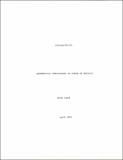| dc.description.abstract | We consider the problem of designing arithmetically complete axiom systems for proving general properties of programs; 1.e. axiom systems which are complete over arithmetical universes, when all first-order formulae which are valid in such universes are taken as axioms. We prove a general Theorem of Completeness which takes care of a major part of the responsibility when designing such systems. It is them shown that what is left to do in order to establish an arithmetical completeness result, such as those appearing in [12] and [14] for the logics of DL and DL+, can be described as a chain of reasoning which involves some simple utilizations of arithmetical induction. An immediate application of these observations is given in the form of an arithmetical completeness result for a new logic similar to that os Salwicki [22]. Finally, we contrast this discipline with Cook's [5] notion of relative completeness. | en_US |
